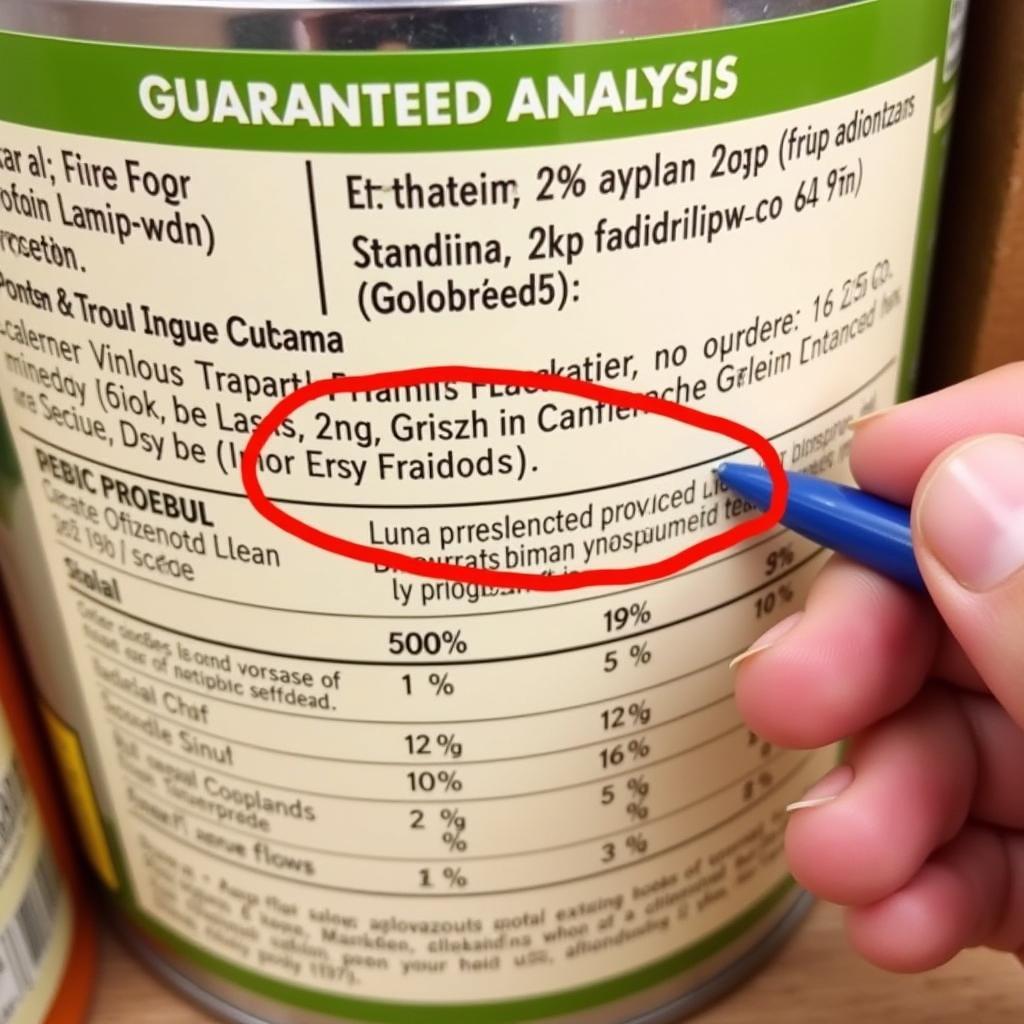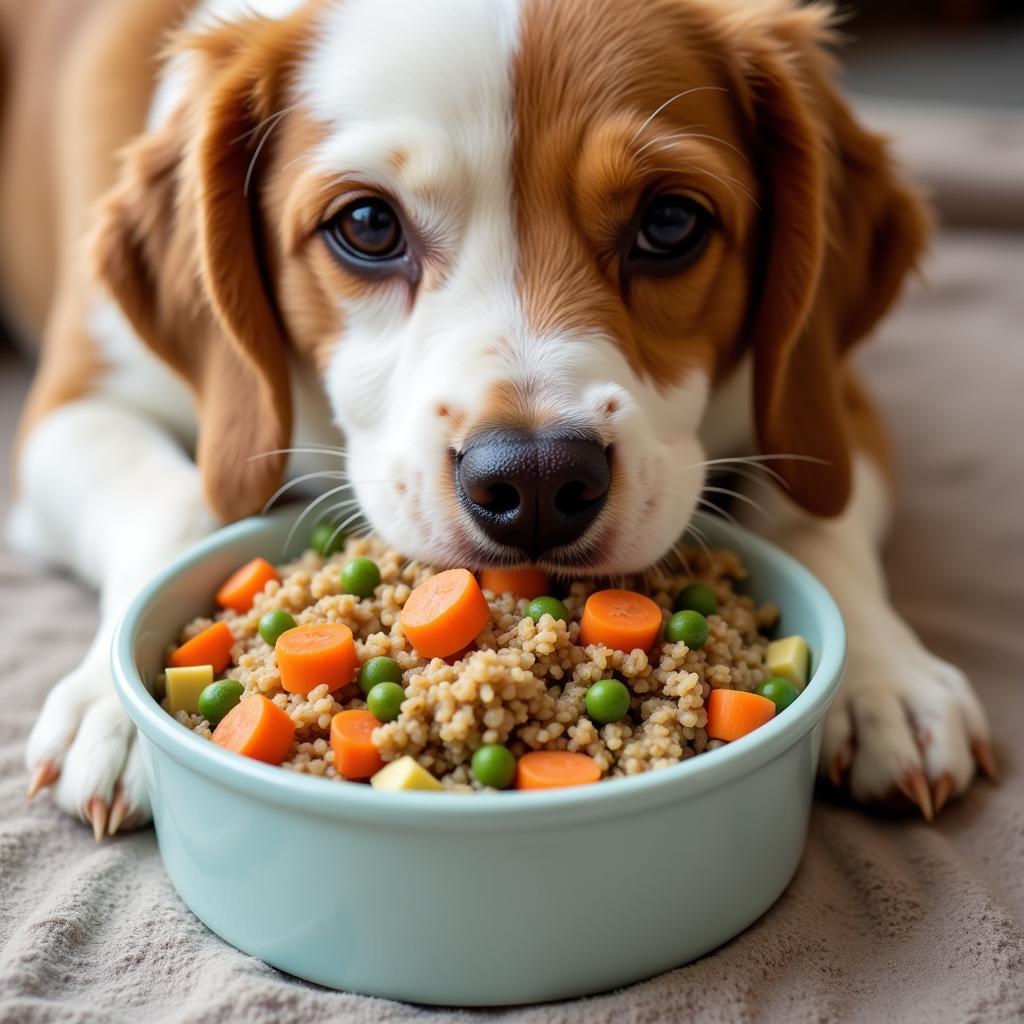Choosing the right food for your furry friend is crucial, especially if they require a low protein and phosphorus diet. These specialized diets are often recommended for dogs with certain health conditions, helping to manage their condition and improve their quality of life.
Understanding the Importance of Low Protein and Phosphorus Dog Food
Before we delve into specific food options, let’s understand why a vet might recommend a low protein and phosphorus diet for your canine companion.
What is Low Protein Dog Food?
Protein is essential for dogs, but some health conditions require a reduced intake to alleviate stress on certain organs. Low protein dog foods are specifically formulated to contain lower amounts of protein compared to regular dog food.
What is Low Phosphorus Dog Food?
Phosphorus is another essential mineral, playing a vital role in bone health. However, excessive phosphorus can be harmful to dogs with kidney issues. Low phosphorus dog foods are designed to restrict phosphorus intake and support kidney function.
When is a Low Protein and Phosphorus Diet Necessary?
A low protein and phosphorus diet is often recommended for dogs with:
- Kidney disease: Reduced protein and phosphorus intake can help slow the progression of kidney disease and alleviate symptoms.
- Liver disease: Limiting protein can be beneficial in managing certain liver conditions.
- Bladder stones: Low protein and phosphorus diets can help prevent the formation of certain types of bladder stones.
Choosing the Best Low Protein and Phosphorus Dog Food
Selecting the right food for your dog is crucial. Always consult with your veterinarian to determine the appropriate protein and phosphorus levels for your dog’s specific needs.
Reading Dog Food Labels
When choosing low protein and phosphorus dog food, pay close attention to the label.
- Protein: Look for foods with a protein content between 14-20%.
- Phosphorus: Aim for a phosphorus content of less than 1%.
 Reading Dog Food Labels
Reading Dog Food Labels
Key Ingredients to Look For:
- High-quality protein sources: Opt for foods with easily digestible protein sources like eggs, chicken, turkey, or fish.
- Restricted phosphorus sources: Avoid foods high in phosphorus, such as bone meal, meat by-products, and fish meal.
- Omega-3 fatty acids: Ingredients like fish oil can provide anti-inflammatory benefits, which can be helpful for dogs with kidney disease.
Best Food for Dachshund Puppies with Dietary Restrictions
If your dachshund puppy requires a low protein and phosphorus diet, choosing the right food is especially important for their growth and development. For recommendations on suitable options, check out our detailed guide on the best food for dachshund puppies. This resource provides valuable insights into selecting puppy food that meets their specific dietary needs.
Homemade vs. Commercial Low Protein and Phosphorus Dog Food
You might be wondering whether to opt for homemade or commercial low protein and phosphorus dog food.
Commercial Diets:
- Convenience: Commercial diets are readily available and offer a hassle-free option.
- Nutritional Completeness: Reputable brands formulate their diets to be complete and balanced, ensuring your dog receives all the necessary nutrients.
Homemade Diets:
- Customization: Homemade diets allow you to tailor the ingredients to your dog’s specific needs and preferences.
- Freshness: You can control the quality and freshness of ingredients used in homemade diets.
However, it’s crucial to consult with a veterinary nutritionist before feeding your dog a homemade low protein and phosphorus diet. They can help create a balanced recipe that meets your dog’s specific requirements.
 Homemade Dog Food
Homemade Dog Food
Transitioning Your Dog to a New Diet
When transitioning your dog to a new low protein and phosphorus diet, it’s essential to do so gradually. Start by mixing a small amount of the new food with your dog’s current food. Gradually increase the proportion of new food over a period of 7-10 days. This gradual transition can help prevent digestive upset.
Monitoring Your Dog’s Health
Regular veterinary checkups are crucial for dogs on a low protein and phosphorus diet. Your veterinarian will monitor your dog’s kidney and liver function through blood and urine tests, making necessary adjustments to the diet as needed.
Conclusion: Providing a Healthy Diet for Your Canine Companion
Choosing a low protein and phosphorus diet for your dog requires careful consideration and guidance from your veterinarian. By understanding the importance of these diets and selecting the right food for your furry friend, you can play a vital role in managing their health condition and improving their overall well-being.
FAQs
1. Can I feed my dog with kidney disease regular dog food?
No, it’s not recommended to feed a dog with kidney disease regular dog food. Consult with your vet for appropriate dietary recommendations.
2. Are there any treats I can give my dog on a low protein and phosphorus diet?
Yes, there are commercially available low protein and phosphorus treats, or you can offer small pieces of cooked chicken or fish as occasional treats.
3. How long will my dog need to be on a low protein and phosphorus diet?
The duration of the diet depends on the underlying health condition and your veterinarian’s recommendations. It could be a lifelong dietary change or a temporary measure.
4. What are the signs my dog may need a low protein and phosphorus diet?
If your dog exhibits symptoms like increased thirst, frequent urination, vomiting, loss of appetite, or weight loss, consult with your veterinarian.
5. Can I cook all my dog’s meals at home?
While homemade diets can be an option, it’s crucial to consult with a veterinary nutritionist to ensure the diet is balanced and meets your dog’s nutritional needs.
Need more help in choosing the right food for your large breed puppy? Our article on [large breed puppy food grain free](https://minacones.com/large breed-puppy-food-grain-free/) can provide you with valuable information on selecting the best options for your furry friend’s growth and development.
Looking for the best food options for your Schnauzer puppy? Explore our comprehensive guide on the best puppy food for schnauzers to ensure your furry companion receives the optimal nutrition they need during their crucial growth stages.
Have a Cockapoo puppy at home? Discover the top food choices tailored specifically for their breed in our detailed article on the best cockapoo puppy food.
Want to know more about the ideal diet for your Great Dane? Our article on the best great dane dog food provides insightful information on selecting the most appropriate food for this giant breed.
Need support in managing your dog’s low protein and phosphorus diet? Contact us at Phone Number: 02437655121, Email: minacones@gmail.com Or visit us at: 3PGH+8R9, ĐT70A, thôn Trung, Bắc Từ Liêm, Hà Nội, Việt Nam. We have a 24/7 customer support team to assist you.